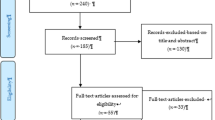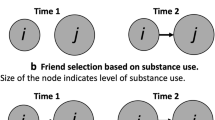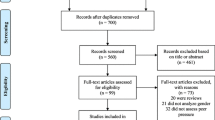Abstract
Aims
To examine which socioeconomic, family, personal and lifestyle risk factors in adolescence were the strongest independent predictors of excessive alcohol use in adulthood.
Methods
In a prospective longitudinal study, all 16-year-olds of one Finnish city completed questionnaires at school, and were followed up by postal questionnaires at 32 years of age [n = 1,471, (females n = 805, males n = 666); response rate 70.3%). The alcohol use disorders identification test (AUDIT) was used to assess alcohol use in adulthood. AUDIT scores of 8 or more for females and 10 or more for males were classified as excessive alcohol use. Adolescent risk factors examined were parental social class, school performance, depressive symptoms, self-esteem, impulsiveness, parental divorce, relationships with parents, parental trust, health behaviour, leisure-time spent with friends, dating, and problems with the law.
Results
All the socioeconomic, family, personal, and lifestyle variables in adolescence, except parental social class in both genders and self-esteem among females, showed significant univariate associations with excessive alcohol use at age 32 years. Multivariate logistic regression analysis showed that among adolescent males, parental divorce, moderate and high level of depressive symptoms, leisure-time spent daily among friends and moderate and drunkenness-orientated drinking were the strongest predictors of excessive alcohol use in adulthood. Among females, the strongest adolescent predictors of excessive alcohol use in adulthood were drunkenness-orientated drinking and frequent smoking.
Conclusions
Early interventions for adolescent substance use and a set of specific psychosocial risk factors should be tailored and evaluated as methods for identifying those at high risk of and preventing excessive alcohol use in adulthood.
Similar content being viewed by others
References
Aalto-Setälä T, Marttunen M, Tuulio-Henriksson A, Poikolainen K, Lönnqvist J (2002) Psychiatric treatment seeking and psychosocial impairment among young adult with depression. J Affect Disord 70:35–47
Aro H (1988) Parental discord, divorce and adolescent development. Eur Arch Psychiatr Neurol Sci 237:106–111
Babor TF, Higgins-Biddle JC, Sauders JB, Monteiro MG (2001) AUDIT the alcohol use disorders identification test. Guidelines for use in primary care, 2nd edn. WHO, Department of Mental Health and Substance Dependence, Geneva
Barrett AE, Turner RJ (2006) Family structure and substance use problems in adolescence and early adulthood: examining explanations for the relationship. Addiction 101:109–120
Biddle L, Gunnell D, Sharp D, Donovan JL (2004) Factors influencing help seeking in mentally distress young adults: a cross-sectional survey. Br J Gen Pract 53:248–253
Central Statistical Office of Finland (1975) Classification of occupations. Central Statistical Office of Finland, Helsinki
Cotton NS (1979) The familial incidence of alcoholism: a review. J Stud Alcohol 40:89–116
Courtenay WH (2000) Constructions of masculinity and their influence on men’s well-being: a theory of gender and health. Soc Sci Med 50:1385–1401
D’Amico EJ, Ellickson PL, Collins RL, Martino S, Klein DJ (2005) Processes linking adolescent problems to substance-use problems in late young adulthood. J Stud Alcohol 66:766–775
DeWit DJ, Adlaf EM, Offord DR, Ogborne AC (2000) Age at first alcohol use: a risk factor for the development of alcohol disorders. Am J Psychiatry 157:745–750
Dubow EF, Boxer P, Huesmann LR (2008) Childhood and adolescent predictors of early and middle adulthood alcohol use and problem drinking: the Colubmia County Longitudinal Study. Addiction 103(1 Suppl):36–47
Eerola M, Huurre T, Aro H (2005) The problem of attrition in a Finnish longitudinal survey on depression. Eur J Epidemiol 20:113–120
Englund MM, Egeland B, Oliva EM, Collins WA (2008) Childhood and adolescent predictors of heavy drinking and alcohol use disorders in early adulthood: a longitudinal developmental analysis. Addiction 103(1 Suppl):23–35
Eriksson CJP, Kaprio J, Pulkkinen L, Rose RJ (2005) Testosterone and alcohol use among adolescent male twins: testing between-family associations in within-family comparisons. Behav Genet 35:359–368
Flannery DJ, Williams LL, Vazsonyi AT (1999) Who are they and what are they doing? Delinquent behaviour, substance use, and early adolescents’ after-school time. Am J Orthopsychiatry 69:247–253
Furstenberg FF Jr, Teitler JO (1994) Reconsidering the effects of marital disruption. What happens to children of divorce in early adulthood. J Fam Issues 15:173–190
Galaif ER, Stein J, Newcomb MD, Bernstein DP (2001) Gender differences in the prediction of problem alcohol use in adulthood: exploring the influence of family factors and childhood maltreatment. J Stud Alcohol 62:486–493
Glenn ND, Kramer KB (1985) The psychological well-being of adult children of divorce. J Marriage Fam 47:905–912
Hayatbakhsh MR, Najman JM, Jamrozik K, Al Mamun A, Bor W, Alati R (2008) Adolescent problem behaviours predicting DSM-IV diagnoses of multiple substance use disorder. Findings of a prospective birth cohort study. Soc Psychiatry Psychiatr Epidemiol 43:356–363
Hawkins JD, Catalano RF, Miller JY (1992) Risk and protective factors for alcohol and other drug problems in adolescence and early adulthood: implications for substance abuse prevention. Psychol Bull 112:64–105
Hope S, Power C, Rodgers B (1998) The relationship between parental separation in childhood and problem drinking in adulthood. Addiction 93:505–514
Hussong AM, Curran PJ, Chassin L (1998) Pathways of risk for accelerated heavy alcohol use among adolescent children of alcoholic parents. J Abnorm Child Psychol 26:453–466
Huurre T, Aro H, Rahkonen O (2003) Well-being and health behaviour by parental socioeconomic status. A follow-up study of adolescents aged 16 until age 32 years. Soc Psychiatry Psychiatr Epidemiol 38:249–255
Huurre T, Rahkonen O, Komulainen E, Aro H (2005) Socioeconomic status as a cause and consequence of psychosomatic symptoms from adolescence to adulthood. Soc Psychiatry Psychiatr Epidemiol 40:580–587
Jefferis BJMH, Power C, Manor O (2005) Adolescent drinking level and adult binge drinking in national birth cohort. Addiction 100:543–549
Jessor R, Donovan JE, Costa FB (1991) Beyond adolescence: problem behavior and young adult development. Cambridge University Press, New York
Kandel DB, Johnson JG, Bird HR, Canino G, Goodman SH, Lahey BB, Regier DA, Schwab-Stone M (1997) Psychiatric disorders associated with substance use among children and adolescents: findings from the methods for the epidemiology of child and adolescent mental disorders (MECA) study. J Abnorm Child Psychol 25:121–132
Kumpulainen K (2000) Psychiatric symptoms and deviance in early adolescence predict heavy alcohol use 3 years later. Addiction 95:1847–1857
Kuokkanen M, Teirilä J (2001) Alkoholin suurkuluttajien mini-interventio työterveysasemalla. Kokeilu S-työterveyspalveluissa Helsingissä. Suom Lääkäril 56:3489–3493
Latendresse SJ, Rose RJ, Viken RJ, Pulkkinen L, Kaprio J, Dick DM (2008) Parenting mechanisms in links between parents’ and adolescents’ alcohol use behaviors. Alcohol Clin Exp Res 32:322–330
Lintonen T, Rimpelä M, Ahlström S, Rimpelä A, Vikat A (2000) Trends in drinking habits among Finnish adolescents from 1977 to 1999. Addiction 94:1255–1263
Lintonen T, Rimpelä M, Vikat A, Rimpelä A (2000) The effect of societal changes on drunkenness trends in early adolescence. Health Educ Res 15:261–269
Maggs JL, Patrick ME, Feinstein L (2008) Childhood and adolescent predictors of alcohol use and problems in adolescence and adulthood in the National Child Development Study. Addiction 103(1 Suppl):7–22
McCarty CA, Ebel BE, Garrison MM (2005) Continuity of binge and harmful drinking from late adolescence to early adulthood. Pediatrics 114:714–719
McGue M, Iacono WG (2005) The association of early adolescent problem behavior with adult psychopathology. Am J Psychiatry 162:1118–1124
McLeod JD (1991) Childhood parental loss and adult depression. J Health Soc Behav 32:205–220
Merline A, Jager J, Schulenberg JE (2008) Adolescent risk factors for adult alcohol use and abuse: stability and change of predictive value across early and middle adulthood. Addiction 103(1 Suppl):84–99
Merline AC, O’Malley PM, Schulenberg JE, Bachman JG, Johnston LD (2004) Substance use among adults 35 years of age: prevalence, adulthood predictors, and impact of adolescent substance use. Am J Public Health 94:96–102
Muthén BO, Muthén LK (2000) The development of heavy drinking and alcohol-related problems from ages 18 to 37 in a U.S. National sample. J Stud Alcohol 61:290–300
Mäkelä P, Gmel G, Grittner U, Kuendig H, Kuntsche S, Bloomfield K, Room R (2006) Drinking patterns and their gender differences in Europe. Alcohol Alcohol 41(1 Suppl):8–18
Needham BL (2007) Gender differences in trajectories of depressive symptomatology and substance use during the transition from adolescence to young adulthood. Soc Sci Med 65:1166–1179
Newcomb MD (1997) Psychosocial predictors and consequences of drug use: a developmental perspective within a prospective study. J Addict Dis 16:51–89
Nolen-Hoeksema S (2004) Gender differences in risk factors and consequences for alcohol use and problems. Clin Psychol Rev 24:981–1010
Paavola M, Vartiainen E, Haukkala A (2004) Smoking, alcohol use and physical activity: a 13-year longitudinal study ranking from adolescence into adulthood. J Adolesc Health 35:238–244
Pape H, Hammer T (1996) How does young people’s alcohol consumption change during the transition to early adulthood? A longitudinal study of changes at aggregate and individual level. Addiction 9:1345–1358
Pelkonen M, Marttunen M, Aro H (2003) Risk of depression: a 6-year follow-up of Finnish adolescents. J Affect Disord 77:41–51
Pitkänen T, Kokko K, Lyyra A-L, Pulkkinen L (2008) A developmental approach to alcohol drinking behaviour in adulthood: a follow-up study from age 8 to age 42. Addiction 103(1 Suppl):48–68
Pitkänen T, Lyyra A-L, Pulkkinen L (2005) Age of onset of drinking and the use of alcohol in adulthood: a follow-up study from age 8–42 for females and males. Addiction 100:652–661
Pulkkinen L, Pitkänen T (1994) A prospective study of the precursors to problem drinking in young adulthood. J Stud Alcohol 55:578–587
Rauste-von Wright M (1975) The image of man among Finnish girls and boys. Report No. 41. University of Turku, Department of Psychology, Turku
Riala K, Hakko H, Isohanni M, Järvelin M-R, Räsänen P (2004) Teenage smoking and substance use as predictors of severe alcohol problems in late adolescence and in young adulthood. J Adolesc Health 35:245–254
Rogers B (1994) Pathways between parental divorce and adult depression. J Child Psychol Psychiatry 35:1289–1308
Rose RJ, Kaprio J, Winter T, Koskenvuo M, Viken RJ (1999) Familial and socioregional environmental effects on abstinence from alcohol at age sixteen. J Stud Alcohol 13(Suppl):63–74
Rosenberg M (1965) Society and the adolescent self-image. Princeton University Press, Princeton
Sauvola A, Miettunen J, Järvelin M-R, Räsänen P (2001) An examination between single-parent family background and drunk driving in adulthood: findings from the northern Finland 1966 birth cohort. Alcohol Clin Exp Res 25:206–209
Scheier LM, Botvin GJ, Baker E (1997) Risk and protective factors as predictors of adolescent alcohol involvement and transitions in alcohol use: a prospective analysis. J Stud Alcohol 58:652–667
Schulenberg JE, Maggs JL (2002) A developmental perspective on alcohol use and heavy drinking during adolescence and the transition to young adulthood. J Stud Alcohol 14(Suppl):54–70
Schulenberg JE, Maggs JL (2008) Destiny matters: distal developmental influences on adult alcohol use and abuse. Addiction 103(1 Suppl):1–6
Sen B (2004) Adolescent propensity for depressed mood and healp-seeking: race and gender differences. J Ment Health Policy Econ 7:133–145
Statistics Finland (2006) Cause of death Statistics. Statistics Finland, Helsinki
Statistics Finland. Labour force survey. http://tilastokeskus.fi/til/tyti. Accessed 10 March 2009
Statistics Finland. Population structure. http://tilastokeskus.fi/til/vaerak. Accessed 10 March 2009
Viner RM, Taylor B (2007) Adult outcomes of binge drinking in adolescence: findings from a UK national birth cohort. J Epidemiol Community Health 61:902–907
Vuorilehto M, Isometsä E, Ihalainen R, Korhonen A (2003) Terveyskeskuspotilaiden masennus, ahdistuneisuus ja alkoholin riskikäyttö [Mental symptoms among unselected users of primary health care, in Finnish with English abstract]. Suom Lääkäril 58:905–908
Warner LA, White HR (2003) Longitudinal effects of age at onset and first drinking situations on problem drinking. Subst Use Misuse 38:1983–2016
Wiles NJ, Lingford-Hughes A, Daniel J, Hickman M, Farrell M, Macleod J, Haynes JC, Skapinakis P, Araya R, Lewis G (2007) Socio-economic status in childhood and later alcohol use: a systematic review. Addiction 102:1546–1563
Wolfinger NH (1998) The effects of parental divorce on adult tobacco and alcohol consumption. J Health Soc Behav 39:254–269
Zucker R (2008) Anticipating problem alcohol use developmentally from childhood into middle adulthood: what have we learned? Addiction 103(1 Suppl):100–108
Acknowledgments
This study was supported by a grant from the Juho Vainio Foundation. Jaakko Kaprio is supported by the Academy of Finland Centre of Excellence in Complex Disease Genetics.
Author information
Authors and Affiliations
Corresponding author
Rights and permissions
About this article
Cite this article
Huurre, T., Lintonen, T., Kaprio, J. et al. Adolescent risk factors for excessive alcohol use at age 32 years. A 16-year prospective follow-up study. Soc Psychiat Epidemiol 45, 125–134 (2010). https://doi.org/10.1007/s00127-009-0048-y
Received:
Accepted:
Published:
Issue Date:
DOI: https://doi.org/10.1007/s00127-009-0048-y




